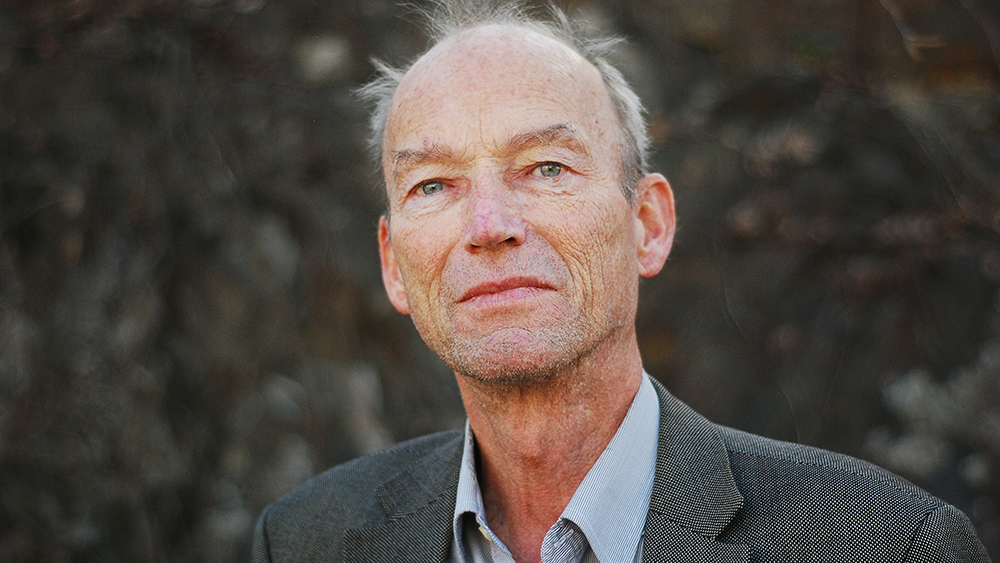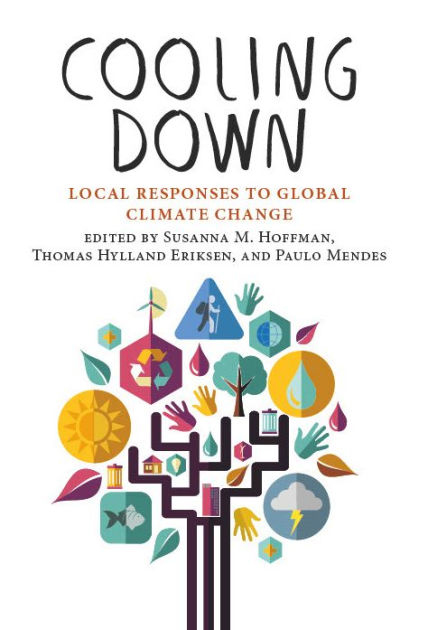Thomas Hylland Eriksen is very concerned about the loss of biodiversity and cultural diversity: "We must rethink our relationship with the environment".

Thomas Hylland Eriksen: In his new research project, the professor at the Department of Social Anthropology is trying to read all processes in nature and culture as an exchange of signs. Photo: Erik Engblad
Since the last Ice Age, the world has been the scene of an explosion of cultural diversity. The variation in ways of life and language, social organisation and cosmologies is staggering. In the long, evolutionary perspective, the diversity of nature has also increased over millions of years.
"This has been the situation up to our time, the Anthropocene. Today, wild animals make up only four percent of the biomass of mammals. Scientists warn that perhaps as much as half of the world's languages will have disappeared in 30 years' time", says Thomas Hylland Eriksen.
"We have painted ourselves into a corner. We now have to find our way out."
This week, the Swedish Society for Anthropology and Geography will award its gold medal to the professor at the Department of Social Anthropology, for Hylland Eriksen's wide-ranging contribution to anthropology. On occasion of receiving the award, the anthropologist has been given the chance to handpick scientists to attend a seminar at Stockholm University.
Topics include biology, culture and bioculture.
"Receiving this medal is fantastic. I have collaborated with colleagues in Stockholm over many years and am really looking forward to going there, we are going to have a really good talk.
State control and market logic
Thomas Hylland Eriksen has just returned from a writing assignment in South Africa. At the Institute for Advanced Study in Stellenbosch (STIAS), the anthropologist has been working on a new research project about the effects of globalisation on biological and cultural diversity.
The hypothesis is that there will be less diversity because of globalisation.
"It is part of the nature of things. The more contact you have, the more similar things become. Strong forces are pushing in the direction of standardisation and homogenisation. It is about state control. The state wants a readable population with the least amount of cultural variation. But globalised capitalism is also an important driving force. Economies of scale mean that if you can do many things in the same way and have standardised processes, you will be able to make more money", says Hylland Eriksen.
At the centre in South Africa, he got in touch with biologists who share the anthropologist's concerns about the loss of diversity.
"The interesting thing is that biologists talk about ecological standardisation in many of the same ways that social anthropologists talk about the loss of cultural diversity", says Hylland Eriksen.
"In both cases, survival depends on locally adapted solutions", he says.
Therefore, the professor believes that anthropologists can contribute important insights in this field.

"We have detailed knowledge about how life differs in different parts of the world. There is a tremendous wealth that we are in danger of losing", he says.
The goal of Hylland Eriksen's latest publication, Cooling Down: Local Responses to Global Climate Change, was to gather local perspectives on the climate crisis from different parts of the world.
"Geographically speaking, climate change affects things very differently. Therefore, the understanding and handling of the problem also vary greatly.
Exchange of signs
Thomas Hylland Eriksen's new research project will hopefully result in a book in Norwegian as early as next year, and a larger publication in English later, maybe in 2024, according to the professor. He wants to develop theoretical tools in order to focus on the loss of biological and cultural diversity through the same lens.
The new project is based on what Hylland Eriksen calls biosemiotics.
"Semiotics is the study of sign systems, and biosemiotics is a method of reading all processes in nature and culture as an exchange of signs. I believe that this perspective has a lot to offer, partly because it can help us to break down the sharp boundary that exists between nature and culture", he says.
Hylland Eriksen uses plantations as an example. According to the anthropologist, plantations lead to ecological standardisation.
"There are many trees on a plantation, but they are all the same. If you take a biosemiotic point of view: There is a large exchange of signs on a plantation, but they are always the same signs", he says.
"It is like everyone is talking at the same time, but they are all saying the same things."
The professor at the Department of Social Anthropology refers to a 2021 article in which he draws on his previous research on nationalism.
"In the same way, it is the case that everyone should be similar within each nation, and there should be sharp distinctions in relation to the outside world. Before nation-building, European countries consisted of many small communities with their own identity, customs and dialects. But the variation was evened out through nation-building", says Hylland Eriksen.
"A world of many small differences is replaced by just a few large ones. You get a world where there are fewer options, both biological and cultural.
Part of the ecology
The consequence is what Thomas Hylland Eriksen calls less 'semiotic freedom'. The opportunity to do something different disappears. The greatest loss, according to the anthropologist, is the reduced flexibility.
In an essay published in Morgenbladet, Hylland Eriksen gives the following example: "If you bet everything on fifteen highly productive varieties of potato, you get more potatoes, but they are similar to each other and you have nothing to fall back on if the crop fails."
"Fossil modernity, the state and capitalism have led to enormous economic, technological and medical developments over the past couple of centuries. In many ways, it has been an adventure. But the party is over now. Modernity must start a new phase", he says.
"You can reduce everything in the world to differences, relationships and processes."
- Thomas Hylland Eriksen
Part of the ongoing research project will be to look at international collaboration on nature conservation and cultural conservation, and analyse the solution proposals that exist, how they work.
"I will be looking at everything from rewilding, i.e. restoring nature to its original state, to attempts to save endangered languages, indigenous peoples and eco villages, but also phenomena such as music traditions and handicrafts. In all cases, we must rethink our relationship with the environment", he says.
Hylland Eriksen holds up his hand.
"You can reduce everything in the world to differences, relationships and processes. When you hold up a hand, you think you see five fingers, but in reality you see the relationships between them. It is what is in between that creates dynamics, not what is inside", he says.
The anthropologist emphasises that biosemiotics is an attempt to find a language that describes the relationship between humans and other beings.
"We must see ourselves as part of ecology, and realise that there are many different ways to relate to the environment. There are many ways to live in one's surroundings. No one thinks it is desirable to abolish the state and the market, but it is important to show that there are alternatives."






